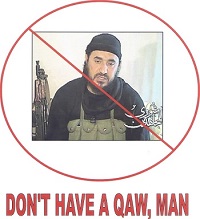Posted on July 6, 2025
Okay, So How Did Iraq
Turn Out, Anyway?
by
Daniel Clark
Critics of
President Trump's bombing of Iran's nuclear sites warn that this conflict is
bound to turn out just like Iraq.
Absolutely not, its defenders respond, it isn't going to turn out like
Iraq at all. As long as those are the
terms of the debate, it has to be asked, how did Iraq turn out, anyway?
The
prevailing narrative about the Iraq War is that it was a terrible failure,
perhaps even a defeat, the repetition of which must be avoided at all
costs. Ask somebody to back that up, and
the two most valid criticisms are going to be that many specifics in the prewar
intelligence proved to be incorrect or unsubstantiated, and that the
post-invasion administration of Iraq was poorly conducted. But neither of these things answers the
question. To present them as if they did
is not so much a historical account as an exercise in postmodern literary
theory. Only through a deconstruction of
the war, by moving peripheral setbacks to the center of the narrative, may its
overall success be obscured.
 How else to explain the dismissive
manner in which the overthrow, capture and execution of Saddam Hussein is
commonly treated by the defeatists and naysayers? He was the enemy, after all. One would think his defeat would be a
decisive factor In assessing the outcome of the war.
How else to explain the dismissive
manner in which the overthrow, capture and execution of Saddam Hussein is
commonly treated by the defeatists and naysayers? He was the enemy, after all. One would think his defeat would be a
decisive factor In assessing the outcome of the war.
After
9/11, it would have been a dereliction of duty for President Bush to leave in
power a dictator with whom we were already at war (since Saddam had never
complied with the terms of the 1991 ceasefire), who ran terrorist training
camps within his own country, and was challenged by only Iran for the title of
the world's leading state sponsor of terrorism.
Saddam is dead, never to train, fund or harbor terrorists again, or to
threaten his neighbors with chemical weapons.
We don't know exactly what was discussed when his Iraqi Intelligence
Service repeatedly met with representatives of al-Qaeda, but we do know that
the intended results will never come to fruition. Any serious discussion of how Iraq turned out
needs to start there.
Saddam's
oppressive government has been dismantled. His sadistic sons Uday and Qusay
were killed by American forces, when their safe house in Mosul turned out to be
not so safe. Al-Qaeda in Iraq was
routed, and its remnants driven from the country. Abu Musab al-Zarqawi, whose terrorist camp on
the Afghan-Iranian border was personally bankrolled by Osama bin Laden, was
killed when his safe house in the Sunni Triangle was bombed by an F-16.
For all
the completely legitimate concerns about the process of nation-building being
undesirable and fraught with difficulties, a new nation now exists in
Iraq. Its government is not the one we
would have chosen, but it has been freely elected. Baghdad has gone from being terrorism's best
friend to one of its mortal enemies.
When Bush announced "The New Way Forward in Iraq" in 2007, he declared
its intention to be the establishment of "a unified, democratic federal Iraq
that can govern itself, defend itself, and sustain itself, and is an ally in
the War on Terror." So far, so good.
Inevitably,
Bush got some things wrong, but that was due mostly to the fact that there are
two sides in a war, and your enemy will not always behave as you
anticipated. He obviously believed
Saddam was crazy enough to stand and fight against the U.S. military, which is
why he expected to find large stockpiles of chemical weapons at the ready. Instead, Saddam turtled up. When UN inspectors reported on his having
swiftly dismantled 58 missile sites shortly before the invasion, that provided
a far more plausible explanation of what had happened to the bulk of his WMDs
than the accusation that Bush had lied about their existence.
 Bush's critics, on the other hand,
were wrong about almost everything, and far less understandably so. Containment was working, they said. Islamic terrorists would never collaborate
with an infidel like Saddam Hussein.
Saddam's military was far too powerful to be defeated on its home
turf. Bush only invaded so he could
plunder Iraq's oil. He was in a "rush to
war," after giving Saddam 14 months' warning and offering to let him go into
exile. Al-Qaeda did not exist in Iraq
prior to the invasion. The terrorists
were invincible. By killing them, Bush
was only multiplying their numbers. The
"insurgency" was a popular uprising among the Iraqi people who were angered by
our presence there. The U.S. had gotten
itself caught in another country's "civil war."
The various factions in Iraq can never coexist without Saddam's iron
fist to hold them down. The Sunni
minority will never participate in the political process. With the Shiites in the majority, Iraq will
be nothing more than an Iranian puppet state.
Bush's critics, on the other hand,
were wrong about almost everything, and far less understandably so. Containment was working, they said. Islamic terrorists would never collaborate
with an infidel like Saddam Hussein.
Saddam's military was far too powerful to be defeated on its home
turf. Bush only invaded so he could
plunder Iraq's oil. He was in a "rush to
war," after giving Saddam 14 months' warning and offering to let him go into
exile. Al-Qaeda did not exist in Iraq
prior to the invasion. The terrorists
were invincible. By killing them, Bush
was only multiplying their numbers. The
"insurgency" was a popular uprising among the Iraqi people who were angered by
our presence there. The U.S. had gotten
itself caught in another country's "civil war."
The various factions in Iraq can never coexist without Saddam's iron
fist to hold them down. The Sunni
minority will never participate in the political process. With the Shiites in the majority, Iraq will
be nothing more than an Iranian puppet state.
None of
this ever came close to being true. Yet
the people who said these things are the ones who have established the
prevailing narrative that the outcome of the Iraq War is some kind of a
catastrophe, and a moral blot on American history. In reality, they are no more correct today
about the past than they had previously been about the present and future.
Perhaps
one reason why there has been so little resistance to this litany of lies is
that the defeatists use our dead and wounded soldiers as rhetorical human
shields. They realize that people don't
want to minimize the sacrifices of our more than 4,000 war dead, and this gives
them license to exaggerate. In truth, the
popular characterization of Iraq as a "quagmire," was nothing more than a
relentless campaign to demoralize the American people.
That narrative
against the Iraq War is based not on a recognition that all war is horrific and
should be avoided whenever possible, but instead on the assertion that this particular
war was uniquely horrific, which is a lie. Eight times as many Americans were killed in
the Korean War as in Iraq. Ten times as
many died in Vietnam. Even the
Spanish-American War, if you include the subsequent Philippine Insurrection,
exceeded the death toll in Iraq by about 50 percent. Iraq was never a quagmire, at least not for
our side. So, what is this devastating
experience that supposedly haunts America?
What is this great national shame?
Nobody ever seems to feel the need to explain.
On
anniversaries of the invasion, factually deficient retrospectives rhetorically
ask if it was "worth it." That's a devious
question, because it is said with the understanding that the hundreds of millions
of us who benefit from the outcome of the war are not going to trivialize the thousands
of soldiers who died while delivering it to us by saying their deaths were "worth
it." The more pertinent questions are
whether the war was necessary, and whether it was successful. The facts listed here tell us the answer is
yes on both counts. Those who have drawn
the opposite conclusion owe us a far better explanation than they have ever been
willing to give until now.
The Shinbone: The
Frontier of the Free Press